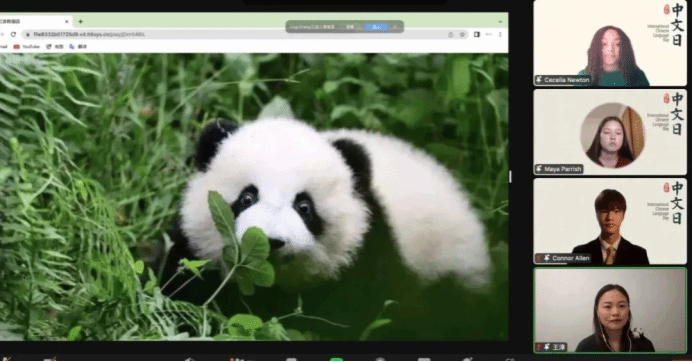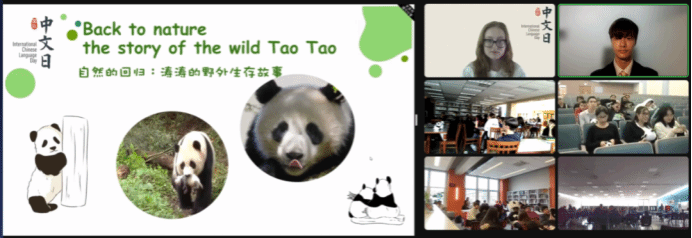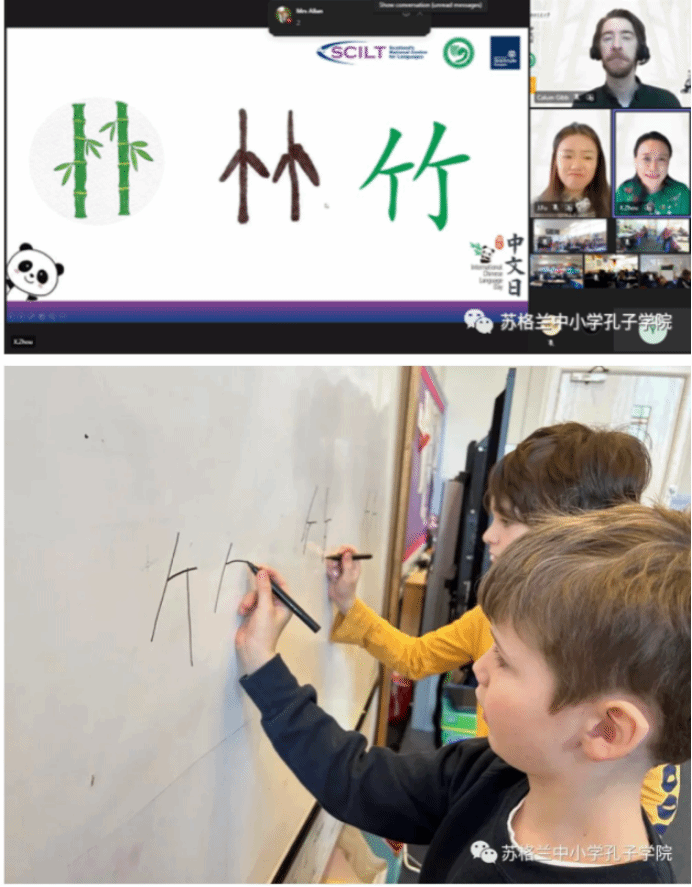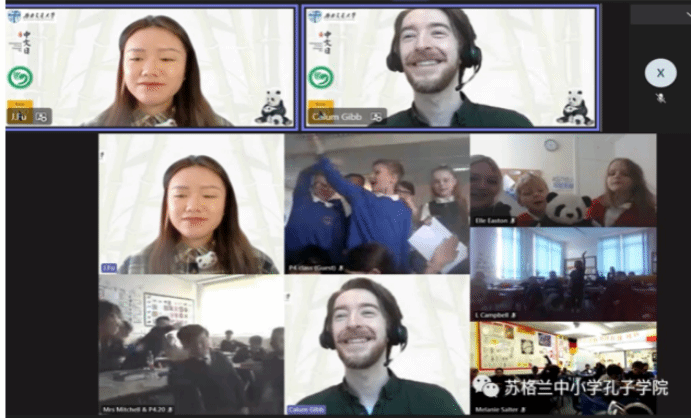April 20th is the 14th United Nations Chinese Language Day and the 4th UN Chinese Language Day initiated by the Center for Language Education and Cooperation and the ChinesePlus. In order to celebrate this common festival for Chinese language lovers all over the world, the School of Foreign Languages of Southwest Jiaotong University, together with the Panda Community——Pandaful, the China Conservation and Research Center for the Giant Panda (CCRCPP), the Chengdu Research Base of Giant Panda Breeding(CRBGPB), and the Sichuan Center for International Communication (SCIC), organized five live series for Chinese language lovers in the UK and the US, with the theme of “An Adventure with Pandas”.

The event attracted over 9,500 registrations from more than 430 primary and secondary schools in the UK and the US as well as 8 US universities, and received more than 60 questions about pandas from overseas viewers. Three Chinese and foreign panda experts from Chengdu were specially invited to the live-stream to have a talk with the audience, which was co-hosted by Chinese and foreign youth

This event is not only a journey to Chinese language, but also a journey to ecological civilization. The live-stream brought the audience multiple experiences , including exploring the visual experience of the Panda Park, interacting with panda experts, feeling the charm of the Chinese, joining the panda knowledge competition, and designing cultural and creative products of panda.

The first live-stream was held on April 8th, 8:00-9:00 a.m.. This was a special session for U.S. college students from eight universities, including Washington University (St. Louis), Duke University, Howard University, Boston University, and the University of North Carolina.They discussed topics such as the ecological conservation and umbrella role of the giant panda with Dr. Fei Yuxiang, an associate researcher from the Sichuan Academy of Forestry Sciences who worked in the Pilot Leadership Group of the Giant Panda National Park Institution, and Dr. James Ayala, an animal behaviorist from the Chengdu Research Base of Giant Panda Breeding, and several U.S. college students asked the panda experts questions in fluent Chinese.
On the morning of April 16th and the evening of April 19th, two special sessions for American teenagers were held as scheduled. Mr. Wang Chun, an expert from the China Conservation Center for Giant Pandas (CCCGP), was on hand to answer questions from the audience. The American youth learned about panda breeding and physiological characteristics by watching the story of the panda Mei Lan’s family, and completed a Chinese character game on the panda family tree. After watching the panda Tao Tao’s story of survival in the wild, the students posted on the message board: “ I love Tao Tao!”, “Where is Tao Tao now?” and “Protecting pandas is very important” and so on.

The sessions for UK youth was held in two regions, Oxford and Scotland. In the Oxford session on April 18th, more than 200 students from five schools attended the live-stream. Under the narration of the two hosts, the audience explored the Panda Park and the Giant Panda National Park in Sichuan, and learned about the breeding process and characteristics of pandas from the panda’s growing up diary and star pandas’ archives.

On the morning of April 19, 2023, 5,034 teachers and students from more than 150 primary and secondary schools and even kindergartens participated in the the live-stream in Scotland, which was an unprecedented event. Before the live-stream, Scottish student representatives visited the panda’s living environment at Edinburgh Zoo and interviewed the panda Yang Guang and Tian Tian’s keepers, and the recorded interview video covered a lot of knowledge about pandas and ecological conservation.

Edinburgh Zoo is one of the featured Confucius Classrooms under the Confucius Institute for Primary and Secondary Schools in Scotland, and as the Chinese partner institution of this featured Confucius Classroom, Southwest Jiaotong University (SWJTU) has been providing long-term support for its teaching activities. SWJTU provided the Scottish children with footage of Yang Guang and Tian Tian’s life before they came to Scotland in 2011, as well as a precious video of the warm welcome they received from the citizens of Scotland upon their arrival. An elementary school student at the live-stream said, “I wasn't even born yet when Yang Guang and Tian Tian came to Scotland, and I want to call them brother and sister.”

During the Chinese character learning session of the live-stream, students learned panda-related pictographs hieroglyphics, and the classroom buzzed with excitement as students scrambled to write the characters.
As the event drew to a close, teachers turned on the cameras and the children cheered and shouted in Chinese, “Hello! Thank you! I love pandas!” Calum, the video writer and event host, said, “When I saw so many happy little faces on my screen, it felt like the event should be considered a success.”

As a follow-up to the live event, the children in Scotland will make blessing cards for Yang Guang and Tian Tian, which will be uniformly made into photo albums by the Confucius Institute for Scottish Primary and Secondary Schools, witnessing Yang Guang and Tian Tian’s 12-year journey of happiness in Scotland with their sincere blessings.

This event is also a special activity of the “YOUTH LINK ” project of the Center for Language Education and Cooperation and Southwest Jiaotong University. The event provided a platform for Chinese and foreign youth to share their concerns on global topics, promote cultural exchanges and interactions, and expand the influence of the Chinese language in the region. Professor Li Chengjian, Director of the International Communication Center of SWJTU, said, “We are very glad that ‘YOUTH LINK’ can be such a bridge.”
Official statistics show that more than 80 countries around the world have incorporated Chinese into their national education systems, with more than 30 million people outside of China learning Chinese, and a cumulative total of about 200 million people learning and using Chinese. As one of the six official languages of the UN, Chinese has played a very important role since the funding of the UN. “The UN Chinese Language Day is a common festival of the global Chinese family, which has been held for four consecutive years, attracting the participation of 150 million people from more than 150 countries around the world.
Department of International Chinese